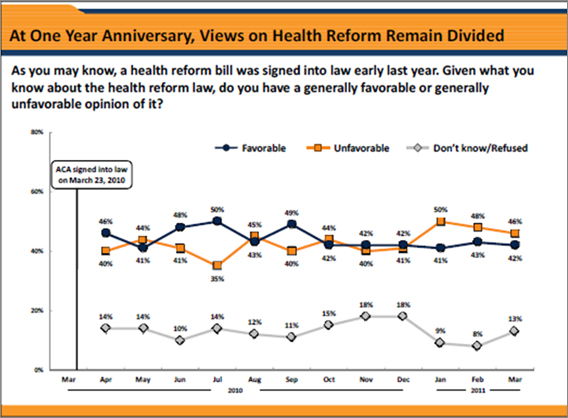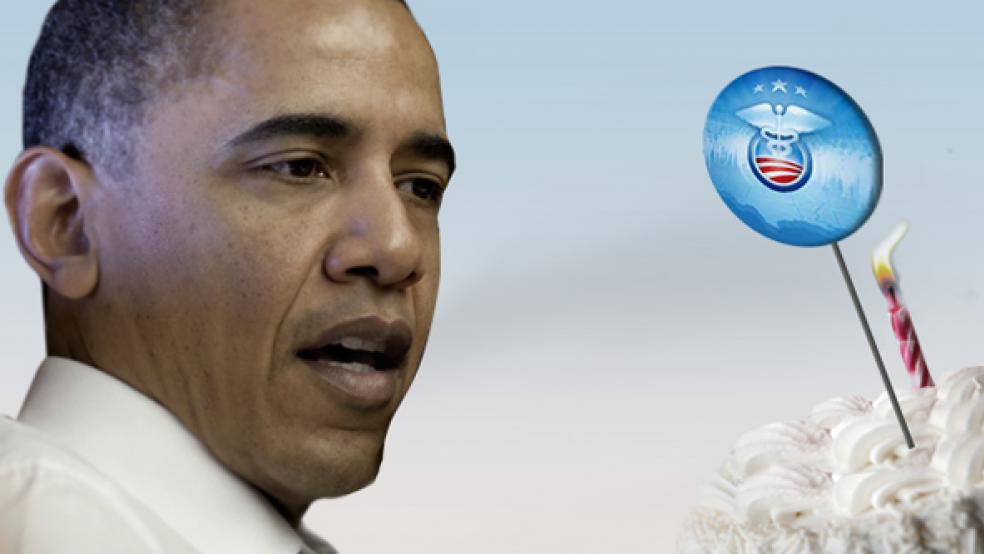How to celebrate the one-year anniversary of Obamacare? Instead of lighting candles on a birthday cake, Republicans would like to torch the whole darn 2,409 page bill. Indeed, earlier this year the newly GOP House enthusiastically passed a measure repealing the legislation, officially known as the Patient Protection and Affordable Care Act. Most Americans would support them.
Despite assurances that the country would come to admire the healthcare bill, most Americans remain unimpressed. A recent Rasmussen poll shows that 53% of voters would like to see the bill done away with, while a Kaiser Family Foundation poll conducted this month indicates that 46% of Americans hold an unfavorable view of the law, while only 42% like it. Considering the boosterism that Democrats – and especially our popular president -- have thrown behind the legislation, that’s not a great showing.

It is not, however, surprising. The bill passed in such ugly fashion, greased by so many cynical compromises and back-room favors, that observers were alerted to its weaknesses from the start. To many Americans, the law’s worst shortcoming was that it did not tackle their greatest concern – namely, the relentless upward spiral of healthcare costs. While the Congressional Budget Office projected that the bill would reduce the federal budget deficit by a net $780 billion between 2012 and 2019, they pinned that pleasing outcome on an entirely unlikely cut in Medicare costs.
In 2015, for instance, a projected $33 billion increase in health insurance exchange outlays and $56 billion jump in spending for Medicaid was estimated to be offset largely by a $50 million reduction in Medicare. The president’s Deficit Commission called those cuts “phantom savings…that will never materialize.” One study published by the free-market favoring Heartland Institute characterized the proposed Medicare cuts as draconian, and projected that by 2017 seniors in cities like Dallas and Houston would lose one third of their benefits.
By 2020, the analysis predicted, Medicare would be paying less to doctors and hospitals than Medicaid – an unsustainable situation that, in fact, did not survive long. Three months after Obamacare became law, Congress passed, and the president signed, a bill that rescinded a 21.3% reduction in Medicare payment rates, essential to the CBO estimates, and at the same time approved a 2.2% increase to the payment schedule.
The budget-easing projections so enthusiastically endorsed by President Obama were so transparently false that Americans became skeptical of the entire package, and rightly so. The gaps in the bill were obvious from the start. First, as the Heartland piece points out, the bill is riddled with wrong-headed incentives that will result in employers dropping coverage and insurers over-insuring those in the programs. Healthy Americans are almost encouraged to game the system by paying a small fee to avoid buying coverage, knowing that they can opt into the program when they become sick.
Second, the absence of significant tort reform in the bill is inexcusable. We all know that fear of litigation drives a substantial portion of healthcare costs. Doctors routinely perform unnecessary and expensive tests to prevent second-guessing in the courtroom; some figure that such spending may cost as much as $55 billion per year. It is not coincidental that in the last two election cycles the legal profession gave about 80% of its substantial donations to Democrats; in 2008 the largest single recipient was Mr. Obama, who received over $40 million from the industry – multiples of the amount received by his rivals, according to OpenSecrets.org.
Perhaps most lamentable, Obamacare does little to encourage healthier lives. It is well known that 20% of our population accounts for 80% of our medical expenditures. The figures on obesity in the country are stunning; two thirds of the adults in the U.S. are judged overweight while one third is obese. Healthcare costs stemming from this plague are upwards of $150 billion per year. One study suggests that medical bills for an obese person run 41.5% higher than those for a person of average weight. Obamacare does little to reward those who work hard battling the bulge.
In addition to numerous obvious gaps in the bill, what has become clearer with the passing months is that the legislation includes several goofs. Certainly the biggest of these was the requirement that all transactions above $600 in value had to be reported to the IRS. Businesses big and small revolted over the dreaded 1099 mandate which the IRS claimed would swamp its capabilities. Thankfully, there is progress towards repealing this absurd directive. (It is notable that though this requirement is universally loathed, Congress has still not actually done away with it.)
Also raising eyebrows is a program in the bill that provides long-term care, called the Class Act, which many (including the Deficit Commission) consider unsustainable. Even the White House is considering changing this particular Trojan horse. Another whoops has to do with the rule that health plans have annual limits of no less than $750,000 – a level so high that any number of organizations offering coverage to low wage or part time workers have been compelled to ask for waivers. So far, some 1,040 organizations from McDonalds to the SEIU, covering more than 2.6 million workers, have received exemptions from this rule. This does not inspire confidence.
Also disconcerting to Americans are the ongoing lawsuits challenging the very constitutionality of the law. In particular, judges are grappling with the question of whether the so-called commerce clause of the constitution allows Congress to require our citizens to buy health insurance. Some think not, but the ultimate resolution will likely be made by the Supreme Court. Since the entire bill appears to hinge on this mandate, many Americans see this controversy as illustrative of the bill’s frail underpinnings.
Overall, many see the bill as overly complex and expensive. Though President Obama and his Democrat colleagues in Congress are in no mood to start over, they may have no choice. Americans do not like this bill, and may rally to elect a president who will not stand in the way of repeal. In any case, we’re not ordering in cake and champagne; this won’t be much of a birthday celebration.






